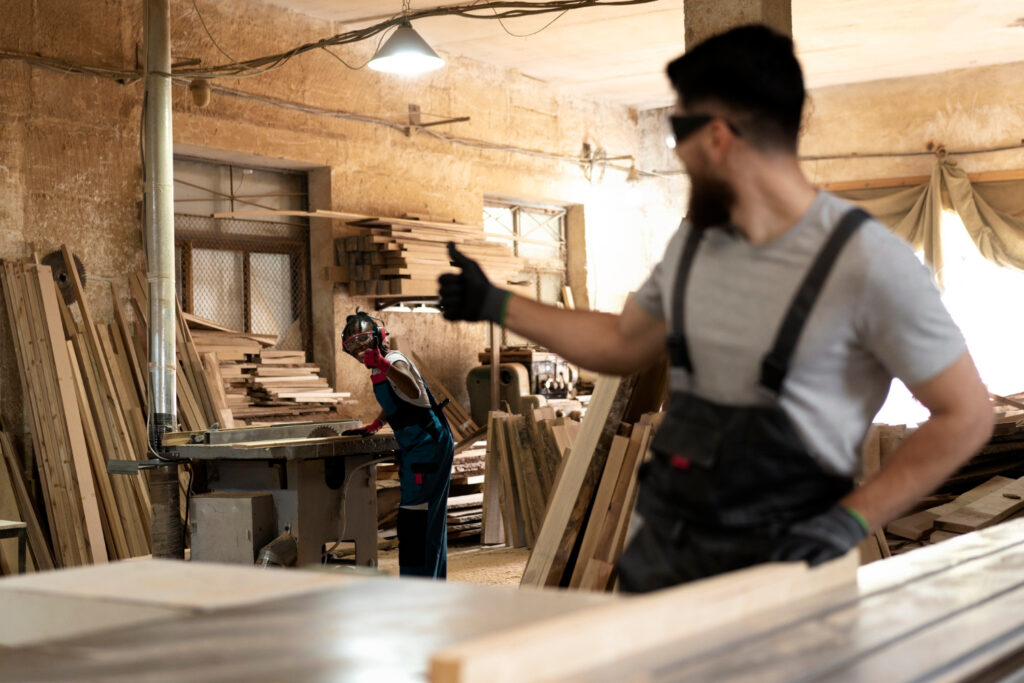There’s something special about building with your own two hands. Carpenters take raw materials and turn them into homes, furniture, and spaces that last for generations.
While the pride of craftsmanship is a big part of the job, many people also wonder: how much do carpenters make?
Whether you’re just starting in the trade or looking to make a career change, understanding the financial side of carpentry is important.
Carpentry isn’t just about hammering nails. It’s a skilled trade that combines technical knowledge, creative thinking, and problem-solving.
From framing new homes to designing intricate cabinetry, carpenters work across many industries and specializations. And that means a wide range of salaries and opportunities.
This guide will walk you through the real numbers behind carpenter salaries, how those numbers vary by location, and what kind of career development plans can help you grow in the field.
What Does A Carpenter Do?
Before we get into salaries, it’s helpful to understand what a carpenter does day to day. If you’re picturing someone swinging a hammer and building a deck, you’re only seeing a small part of the picture.
Carpenters work in many different job types. Some are rough carpenters, which involves structural framing.
Others are finish carpenters, which is finer details like molding and cabinetry. There are also those in niche fields like scenic carpentry for stage design or historical restoration.
You can learn more about what defines a carpenter in this detailed guide: What Is a Carpenter?
The work itself requires more than just physical effort. Carpenters need to be comfortable reading blueprints, calculating measurements, and understanding building codes.
They work with power tools, hand tools, and sometimes advanced machines like CNC routers.
Depending on the role, a carpenter might be part of a small team on a residential project or one of many team members on a large commercial site.
In British English and American English, the word “carpenter” means the same thing, though some terminology on job sites may vary.
What’s universal is that the job involves precision, responsibility, and getting it right the first time.
And a good set of soft skills like communication, time management, etc. Whether it’s coordinating with other trades or explaining timelines to clients, these nontechnical skills are just as important as knowing how to use a square or set a joist.
How Much Do Carpenters Make In The United Kingdom?
Across the UK, a carpenter’s salary ranges from £25,000 to £45,000 per year, depending on skill level, experience, and location.
Entry-level carpenters or those fresh out of apprenticeships earn around £18,000 to £23,000 per year. As experience grows and more skills are developed, that number increases.
Mid-career carpenters, those with around 5 to 10 years under their belt, earn between £30,000 to £38,000.
More experienced carpenters, especially those who specialise in areas like bespoke joinery, restoration work, or high-end fittings, can earn £40,000 or more.
In London and parts of the South East, salaries can push even higher due to high demand and a higher cost of living.
Self-employed carpenters in the UK often charge day rates instead of annual salaries. A typical day rate can be anywhere from £150 to £250, depending on the job complexity, region, and reputation.
For a busy year that can bring annual earnings to £50,000 or more, although income can vary with seasons and project availability.
These are not just technical roles, they require strong soft skills like negotiation, reliability, and customer service.
Whether you’re working with a small team on residential refurbishments or subcontracting on larger commercial builds, your approach to the job often matters as much as your craftsmanship.
For those who set clear career goals, it’s not just about working harder, it’s about working smarter.
Understanding market rates, building a solid professional network, and investing in career development plans can unlock new income potential over time.
Carpenters who treat their work like a business often find more consistency and long-term success in both earnings and growth.
Table Showing Carpenter’s Salary Throughout!
| Experience Level | Hourly Rate | Monthly Salary | Yearly Salary |
|---|---|---|---|
| Apprentice / Junior | £8 – £11 | £2,600 – £3,300 | £2,600 – £3,300 |
| Junior Carpenter (1–3 yrs) | £11 – £15 | £2,600 – £3,300 | £2,600 – £3,300 |
| Mid-Level (4–9 yrs) | £15 – £20 | £2,600 – £3,300 | £30,000 – £40,000 |
| Senior Carpenter (10+ yrs) | £20 – £25 | £3,300 – £4,100 | £40,000 – £50,000 |
| Specialist / Bespoke / Self-Employed | £25 – £35+ | £4,100 – £5,800+ | £50,000 – £70,000+ |
What Affects A Carpenter’s Salary?

Several things affect how much a carpenter earns. Experience is one of the biggest. As carpenters move from apprentice to journeyman to master level, their earning power grows.
Each stage requires not only time on the job but also consistent learning and development. Some states have formal apprenticeship programs that include mentorship, classroom hours, and hands-on training.
These programs not only prepare you technically but also help build your professional network.
Specialisation plays a big role in pay differences. A cabinetmaker or restoration specialist can earn more than a general framer simply because of the precision and detail their work requires.
Commercial carpenters working on high-rise buildings or industrial projects often earn more than residential carpenters because of the scale and complexity of the job.
Union affiliation is another factor. Union carpenters generally earn better wages, benefits, and job security.
Being part of a union can also connect you with more structured career progression frameworks and resources for training and development. Many carpenters see unions as a clear path to stability and long-term growth.
Education and certification can also increase earnings. A carpenter who invests in learning green building, blueprint reading, or even teaching others can open up new roles and higher pay.
Even strong English skills are a skill not to be overlooked, especially when dealing with clients or coordinating teams.
And then there’s the business side. Self-employed carpenters who learn how to quote accurately, manage time, and maintain good relationships often outperform others financially.
These business skills lead to stronger client trust and more repeat work, which is key to anyone trying to meet their career goals.
Regional Variations: Where You Work Matters
Location makes a huge difference in how much carpenters make. In states like California, New York, and Alaska, carpenter salaries often run higher than the national average.
Carpenters in these areas can make upwards of $70,000 to $90,000 per year, partly due to union strength and the high demand for skilled trades in large metropolitan areas.
But you have to weigh those numbers against the local cost of living. A $75,000 salary in San Francisco doesn’t go as far as it would in a small town in the Midwest.
Carpenters in lower-cost states like Texas, Georgia, or Indiana might make less overall, $45,000 to $55,000, but they also spend far less on housing, food, and transportation.
Urban vs rural settings also impact wages. Larger cities offer more work and better pay, while rural carpenters may rely on word of mouth, seasonal demand, and repeat clients.
But working in rural areas can bring other advantages, more autonomy, less competition, and a stronger sense of purpose that comes from serving your local community.
Government contracts, infrastructure projects, and regional economic conditions also impact salaries.
For example, after natural disasters or in booming housing markets, pay often increases due to labor shortages and tight deadlines.
Career Progression And Long-Term Growth

One of the best things about a career in carpentry is the clear progression path. It starts with an apprenticeship, then junior or site carpenter roles, and then more advanced or specialist positions. Some go on to become site supervisors, project managers, or even start their firms.
With the right career plans, many carpenters move beyond the tools and into leadership roles. Managing projects, mentoring apprentices, or training recruits are all steps towards a more senior role and often come with more pay and job security.
Those who invest in personal development can move in new directions like custom furniture design, architectural joinery, or eco-building. Each new skill adds to your toolkit and makes you more competitive in the job market.
Joining a professional network, attending trade events, or taking courses in business, design, or sustainable materials can be part of your career growth. Carpentry is a trade that rewards both skill and ambition, and there’s no ceiling to what you can achieve.
Additional Benefits And Perks of Working As A Carpenter
While salary is a big consideration, it’s not the only reason people stay in the trade. Many carpenters enjoy the autonomy and variety their work brings. Whether you’re building a bespoke staircase or framing a new build home, every day is different.
Unionised carpenters have access to healthcare, pensions, and annual leave. Non-union jobs often have perks like fuel allowances, tools, or ongoing education. And there’s the satisfaction of creating something tangible, a home, a room, a finished space that will last.
Working in a small team, especially in domestic carpentry, means you can form close professional relationships.
You’re not just turning up for a paycheque; you’re contributing to projects that have a lasting impact, often directly tied to someone’s home or business.
How To Maximise Your Earning Potential

If you want to increase how much you earn as a carpenter, specialise. The rarer and more in demand your skill, the more valuable you become. Bespoke furniture, timber framing, and conservation carpentry are high-value niches.
Invest in yourself. Build a website, start an Instagram portfolio, or ask for online reviews. A digital presence can bring more leads than word of mouth alone.
Master quotes, time, and subcontractors, and you can take on more work without burning out. If you’re leading jobs or thinking of scaling up, those are the tools that will get you to the next level.
And surround yourself with others who share your values. Whether it’s a mentor, a professional network, or other trades on site, the people around you can help guide your career and open doors you never knew existed.
Conclusion
Carpentry is more than a trade, it’s a lifelong craft with solid earning potential, clear growth opportunities, and real job satisfaction.
Whether you’re just getting started or planning your next move, understanding the financial side of the industry helps you make smart decisions that support both your income and your ambitions.
With the right mix of skill, reputation, and drive, there’s no limit to what a carpenter can earn in the UK. Whether you’re driven by income, a sense of purpose, or the satisfaction of a job well done, this is a career built not just on wood but on grit, talent, and vision.







